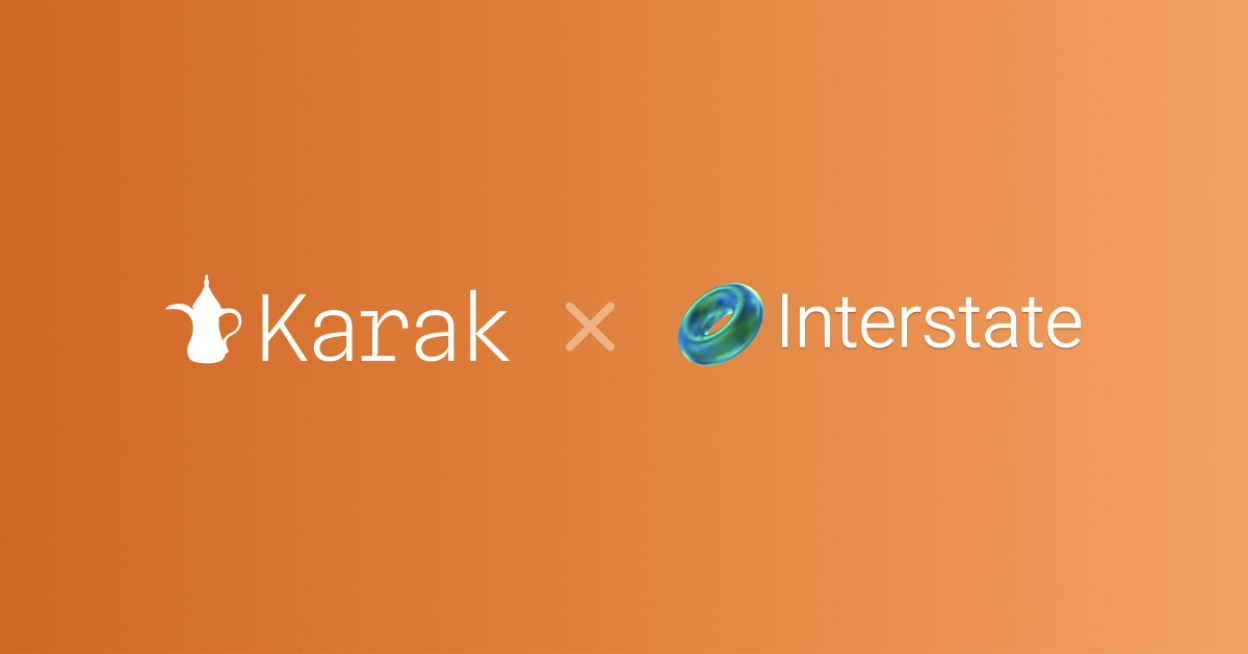Introducing Interstate: The Leading Proposer Commitment Network Powered by Karak

Karak is thrilled to announce its collaboration with Interstate, integrating its novel Alternative Block Auction Network supporting pre-confirmations and based rollups into Karak’s Distributed Secure Service (DSS) framework. This partnership aims to offer near-instant finality to Ethereum L1 users and offers applications self-sequencing supported by Karak’s universal, verifiable network. The Interstate network supports Preconfirmations, App-Specific Sequencing, and Based Rollups.
Interstate is a novel proposer commitment network that adds continuous transaction confirmation onto Ethereum Mainnet. This makes transactions on Ethereum mainnet as fast as Solana.
Interstate offers users:
- Instant Transaction Confirmations on Ethereum L1. Currently, users must wait 12 seconds to receive a first confirmation on Ethereum but with Interstate’s network, users on Ethereum can now benefit from instant transaction confirmation. Interstate will also be integrating with leading wallets to allow instant transaction confirmations.
- Offer Apps Self Sequencing. Apps on Ethereum L1 can self-sequence their own transactions, allowing DApps to recapture MEV that previously leaked to validators.
- Rollups instant L1 finality. Interstate offers L2 networks the ability to prepurchase blockspace, hedging future block prices and also allowing them to provide their users with instant Layer 1 finality.
Karak’s Distributed Secure Service (DSS)
Karak’s Distributed Secure Service (DSS) is a decentralized framework that leverages restaked assets to enable secure and scalable services. This framework is designed to be flexible, extensible, and scalable, making it suitable for a wide range of applications, from basic utilities to complex AI-powered systems.
Interstate's Proposer Commitment Network
Interstate is developing a DSS for its Alternative Block Auction Network on Karak, enhancing the security and efficiency of decentralized systems, including AI, blockchain rollups, and data availability networks.
The first iteration of the Proposer Commitment of Network will focus on securing the commitments made by Interstate on Karak. This means Interstate will leverage security from Karak to back the proposer's commitments. The proposer is auctioning off space in the upcoming block while the users prepurchase space. The integration of Interstate with Karak also allows the weight of the proposer's commitments to be stronger, increasing the amount of value that can be exchanged between the proposer and the blockspace buyer, giving stronger commitments to both parties.
Conclusion
Karak is built for developers by developers. Integrating Interstate on Karak accelerates the vision of making ethereum L1 fast and affordable for everyone, everywhere. If you want to build on the Interstate DSS, are considering building a DSS, or are already building a DSS on Karak, please reach out!
About Karak
Karak is a universal network for verifiable finance that makes it easy to provide universal security with any asset on any network, and unlocks a new design space for developers to seamlessly and securely create innovative distributed networks. Karak is designed to be inherently flexible, extensible, and scalable, making it the only platform for any distributed service to be secured with any asset on any network.
Website | X (Twitter) | Discord | Telegram | Documentation
About Interstate
Interstate is the leading proposer commitment network, making the Ethereum L1 useful, fast and affordable. Interstate believes in a future where Ethereum L1is fast and affordable, empowering every individual and community with the tools to innovate, create, and advance our world. The Hyperbolic founding team is led by a leading engineering team with backgrounds from Amazon Web Services, Coinbase, Uniswap, Snapchat and more.